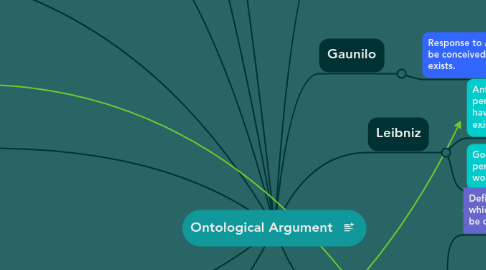
1. Bertrand Russell
1.1. Pro-Kant
1.1.1. Existence is not a predicate, tells us the position in the spatio-temporal world.
1.1.1.1. A: Cows are brown B: Cows are brown and exist
2. Renee Descartes
3. David Hume
4. Richard Dawkins
5. Thomas Aquinas
5.1. Anti-Anselm
5.1.1. -Transitional of moving from definition of God to existence of God
5.2. A posteriori only can be used to show God's existence in reality.
6. Norman Malcolm
6.1. 1)God does not exist, 2) God exists contingently, 3) God exists neccesarily
6.1.1. 1)invalid assumed from Anselm)
6.1.2. 2) If god existed contingently, he would be no greater than any other being. Therefore it would be meaningless for God to exist contingently.
6.1.2.1. Therefore, God must exist neccesarily.
7. New node
8. Kant
9. Leibniz
9.1. Anti-Liebniz : No matter how many perfections we can imagine God to have, you cannot define God into existence. -Hume
9.2. God must exist, as God lacks no perfections but for God not to exist would be meaningless (Pro Anselm)
10. Anselm
10.1. Definition of God: 'That than which nothing greater can be concieved'
10.1.1. If God does not exist, greater being can be concieved, (logically impossible)
10.1.2. God exists in intellectu and in re OR in intellectu alone
10.1.2.1. Existing 'in re' adds perfection to understanding 'in intellectu' alone.
10.1.2.1.1. If god has all perfections then He must have existence.
10.2. God has neccessary existence
10.3. Deduced the attributes of God from the perfection which is inherent in the concept of God itself
10.4. Strengths
10.4.1. God is non-contingent
10.4.2. God is without limits
10.4.3. God is beyond a posteriori proof
10.4.3.1. God is not open to empirical proof
10.4.3.1.1. Therefore, God exists
11. Gaunilo
11.1. Response to Anselm: An island could be conceived, of which no greater exists.
11.1.1. Anselm's response: You cannot apply God's non-contingent existence, to contingent objects (the island does not have to exist, but God has to exist.
